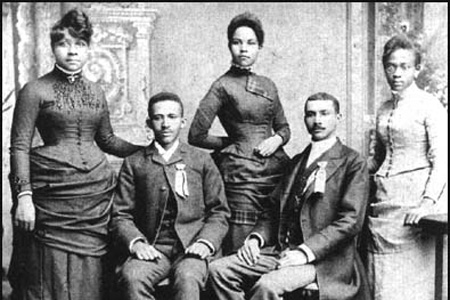
Five Fisk graduates—From 1888. W.E.B. DuBois is second from the left.
Week of Jan. 8-15
1866—Fisk University is founded in Nashville, Tenn., for recently freed slaves by the American Missionary Association. The college grows to become one of the leading Black institutions of higher learning in America by graduating several figures that played major roles in Black cultural, political and entertainment life.
1906—Poet and novelist Paul Lawrence Dunbar dies. Born in Dayton, Ohio, Dunbar rapidly gained national recognition as a poet. Although he only lived to be 33, he was prolific—writing short stories, novels, plays and songs. In Dayton, he was a classmate of the Wright brothers of aviation fame. In fact, the Wright brothers helped Dunbar finance his newspaper—the Dayton Tattler.
1935—Black Enterprise magazine founder and publisher Earl Graves is born on this day in Brooklyn, N.Y.
1946—Poet Countee Cullen dies at age 42 in New York City. Cullen was one of Black America’s greatest poets and novelists. One of his most controversial works was “The Black Christ & Other Poems.” He was born in 1903. But some mystery surrounds exactly where he was born with both Baltimore and New York City being given as his place of birth. Cullen also taught high school. One of his best known students was the great writer James Baldwin.
1967—The Georgia legislature finally seats Representative Julian Bond. In an amazing anti-democracy display of arrogance, Georgia legislators had refused to allow Bond to take the seat he had duly won because of his opposition to the U.S. war in Vietnam. But a 1966 U.S. Supreme Court ruling declared their action unconstitutional. Bond later became chairman of the NAACP Board of Directors.
January 10
1924—Legendary Jazz drummer and composer Max Roach is born in New York City. He was perhaps the greatest drummer-composer of the Jazz era performing with some of America’s best known Jazz musicians and singers. He formed Debut Records in 1952 with bassist Charles Mingus.
1957—The Southern Christian Leadership Conference is founded in New Orleans, La., by a group of Black ministers led by Rev. Martin Luther King Jr. The SCLC goes on to become one of the premier leadership organizations of the Civil Rights Movement. Among the original founders were Ralph Abernathy, Joseph Lowery, Fred Shuttlesworth and C.K. Steel. Washington, D.C., minister Walter Fauntroy was chairman of the board of directors and one of the leading women of the Civil Rights Movement, Ella Baker, became executive director. In 2009, King’s daughter Bernice was elected to head the organization.
January 11
1965—The extraordinarily talented author and dramatist Lorraine Hansberry dies. Deeply committed to the Black struggle, Hansberry’s brilliant career was cut short by cancer. She was only 35. Her primary works included “A Raisin In The Sun” and “To Be Young, Gifted and Black.” “A Raisin In The Sun” became the first play written by a young Black woman to be produced on Broadway.
1971—Popular R&B singer Mary J. Blige is born on this day in the Bronx, N.Y. She is said to be currently working on a movie about the legendary career of songstress Nina Simone.
1988—Scientists (paleo-anthropologists) announce the discovery of the “African Eve”—the mother of all humankind. Based on research in East African involving mitochondrial DNA, the researchers from the Wellcome Trust Centre for Human Genetics in Oxford, England, conclude that the original woman evolved in East Africa approximately 200,000 years ago and that all of humanity can ultimately trace their ancestry to this woman. However, some more recent studies suggest that humankind first evolved in Southern Africa.